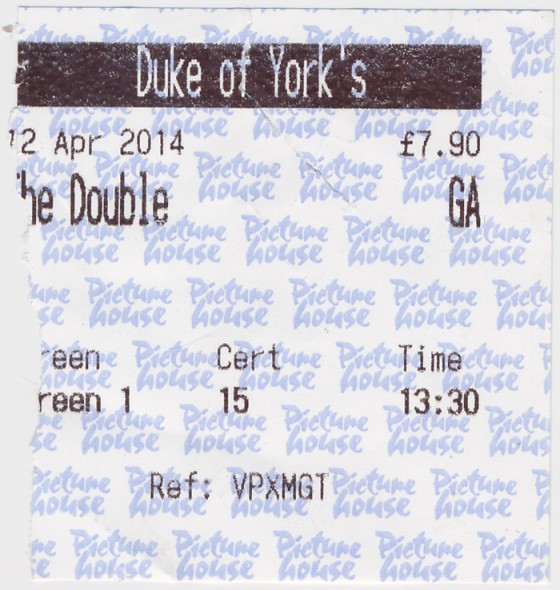The Double

Art House Cloverfield
God bless Encyclopedia Dramatica for finally revealing to the world that I am a jerk. No, in the other way. Clicking through, as one does, I came upon the section ‘Nice_Guy‘, and realized that I was, exactly like all other nice guys, the worst human that ever lived. Equally. See, liking girls and not saying anything doesn’t make you deep, it just make you a coward. There’s further that teensy bit of misogyny in worshipping from afar and lying. And for all cute girls reading this, by that I mean: I’m sensitive: love me!

So when various types opine about the merits or demerits of the amount of theft vis-a-vis The Double, (‘Great artists steal; mediocre artists steal and quote Picasso’), I just wondered: what about this character? Isn’t it time we just called this tired old trope for what I, I mean it, what it, is? A stalker. And not a little bit uncreepy. There isn’t going to be a moment, despite the various visual flair it may or may not provide, when the girl finds the postcards you dug out from her trash and pieced back together and says ‘Aww’. And if there is such a moment, it follows that the young lady in question is as mentally unstable as her erstwhile worshipper. Which means it does work out perfectly forever. Nevermind.
And, in all fairness to the film (fairness being defined as the reciprocity I felt in writing: 'That was 90 minutes?')...
And for you Hollywood types out there, can we finally see what happens dysfunctionally ever after. In any romcom, the quick realization that meeting cute is not enough to sustain a relationship, but this stalker/-ee would be especially rich : ‘You just don’t secretly hide my dried blood under your eyelids like you used to!’ ‘You think I’ve changed? Since when did you start having thoughts of your own? I created you with my own projections!’ ‘That’s more like it!’ (Hugs).
Aww.
Now Cloverfield is pretty awful as films go, though hardly the worst JJ Abrams infected joint. Ooh, let me not rephrase that last sentence. Anyway, one of Cloverfield’s unintentionally redeeming features is that the characters are so utterly contemptible (hey, there’s a nice_guy in that one too!), that you’re rooting for the monster not only to win, but for the evisceration to be especially intestinal. The Double succeeds to some extent for the moments where the evil double dismantles our dislikable hero’s life. I felt like I was watching a commercial for, well, for anything really. If I’m watching Kevin Bacon trying to do ‘Britain’, the squirm factor is usually so high that I would go out of my way to not buy whatever product he is hawking. If I could remember what it was.
Hey! That was a successful commercial!

Sad especially since I enjoyed Mr. Ayoade’s first film. Can we agree to pan this so he’ll now do something good?
The Double is a commercial for the nice_guy, and so you root for the Double, who is, I don’t know, AT&T. The Double may be stealing our ant-agonist’s reports and sleeping with girls, including the stalkee, but in this film, he’s the best you’re going to get. And in all fairness to the film (fairness being defined as the reciprocity I felt in writing: ‘That was 90 minutes?’), Mr. Jesse Eisenberg is very much enjoying being all charismatic and roguish. Maybe that should be a tip-off. If an actor is not having fun playing a character, we’re not having fun watching. Let’s made that a rule for all time, with no exceptions, shall we?
But the Cloverfield aspect is not enough to sustain a film, and we have the further problem in the year of the weird, what will now be forever tagged ‘The Year of the Apeshit Crazy Ape-Horse’. Still more credit to me, and who else is going to give it, I had written this problem down going in: ‘Art-House weird has a higher bar than Studio weird’. Or at least a pin-stripier gradation chamber. And this is finally where The Double falls apart. It’s fine that you have a double, and no one else can see that you look alike. It’s fine, kinda, that suddenly many plot-points soon revolve people believing that you do look alike. But setting in this in a Gilliamesque environs is weirdly the same problem that Mr. Gilliam had with his recent addition to the Ape-Horse Year, that is, The Zero Theorem. If you’re doing a story where reality has been shifted, don’t set it in a place where reality has been shifted. Sr. Luis Buñuel understood this, as did Mr. David Cronenberg. The odd only works in an environment that isn’t. It’s like therapy. On the basis of being one step away from reality, you get to see that reality is not as solid as you thought. When this occurs in a place where nothing is defined, then nothing can be redefined.
So, The Double is the real-life equivalent of what it would be like if I was a therapist. Still want to see it?
The Take

-$10.50
The Lonely Comments Section

 [logo]
[logo]